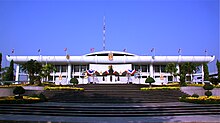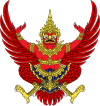Senate of Thailand
Senate of Thailand
Jump to navigation
Jump to search
Senate วุฒิสภา Wutthisapha | |
|---|---|
 | |
| Type | |
| Type | Upper house |
| Structure | |
| Seats | 150 Members |
Political groups | 76 elected and 74 appointed the Academic Sector, the Public Sector, the Private Sector, the Professional Sector and Others |
| Elections | |
Last election | 2 March 2008 |
| Meeting place | |
 | |
Parliament House of Thailand | |
| Website | |
www.senate.go.th | |
Thailand |
|---|
 |
This article is part of a series on the politics and government of Thailand |
Constitution
|
Monarchy
|
Government 
|
National Legislative Assembly 
|
|
Elections
|
Administrative divisions
|
Foreign relations
|
Related topics
|
|
The Senate (Thai: วุฒิสภา, RTGS: Wutthisapha, IPA: [wút.tʰí.sà.pʰaː]; formerly known as Thai: พฤฒสภา, RTGS: Phruetthasapha, IPA: [pʰrɯ́t.tʰá.sà.pʰaː]) was the upper house of the National Assembly of Thailand, (Thailand's legislative branch). In accordance with the 2007 Constitution of Thailand, the Senate was a non-partisan legislative chamber, composed of 150 members. Seventy-six Senators were directly elected from the 76 Provinces of Thailand and Bangkok, while the other 74 were appointed from various sectors by the Senate Selection Committee. The Senate operated under fixed terms of six years.
Both the Senate and the House of Representatives were abolished as a result of the 2014 Thai coup d'état. These were replaced with the unicameral National Legislative Assembly, a body of 250 members, selected by the National Council for Peace and Order.
Contents
1 History
2 Qualifications
3 Election and selection
3.1 Elections
3.2 Selection
4 Term
5 Membership
6 Powers
7 Leadership
8 See also
9 Literature
10 External links
History[edit]
The idea of bicameralism first permeated Thai politics with the Constitution of 1946, when the government of Pridi Banomyong introduced a senate modelled on the British House of Lords. For the first time, an upper house came into existence in Thailand. The Senate was to be fully elected, however, the elections would be indirect, as the House of Representatives would elect the senators, for six-year terms. The 1946 Constitution was soon abrogated in a military coup. Subsequent constitutions saw only occasional bicameralism, and when it did exist, the Senate was always filled with appointees from the military and the elite. The 1997 Constitution saw a return to a fully elected Senate. That constitution was abrogated after the 2006 coup, and replaced with one calling for a half-elected/half-appointed Senate.
- 1947 – First Thai Senate established with 100 members, all royally appointed.
- 1952 – Establishment of a unicameral National Assembly with 123 members.
- 1968 – Re-establishment of the Senate with 164 royally-appointed members.
- 1972 - The Thai Legislature is banned by Thanom Kittikachorn.
- 1974 – Return of the royally-appointed Senate.
- 1976 – Re-establishment of a unicameral National Assembly with 360 members, all royally appointed.
- 1978 – Return of a Senate with 225 royally-appointed members.
- 1991 – Establishment of a unicameral National Assembly with 292 royally-appointed members.
- 1997 – Establishment for the first time of a fully and directly elected Senate with 200 members for a 6-year term.
- 2006 – Following the coup, an interim charter was signed establishing a 250-member National Legislative Assembly.
- 2007 – Half of the Senate is appointed, half is elected as established by referendum under the 2007 Constitution.
- 2014 – Abolished as a result of the 2014 Thai coup d'état.
Qualifications[edit]
The qualifications for the membership of the Senate could be found in section 115, Part 3, Chapter 6 of the 2007 Constitution. A candidate intent on being a member of the Senate had to be a natural born citizen of Thailand as well as being 40 years or older on the year of election or selection. The candidate must have graduated with at least a bachelor's degree or an equivalent. If the candidate was to be elected, he or she must have been born, must have had a home and had to be registered to vote in the province which the candidate intended to represent. The candidate must not have been an ascendant, spouse or a child of a member of the House of Representatives or any person holding a political position and must not have been a member of a political party for at least five years.
All other disqualifications were similar to that of the House, the individual must not have been: addicted to drugs, been bankrupt, a convicted felon, a member of a local administration, a civil servant, a member of the judiciary or any other government agency. Being disenfranchised (being a member of the clergy, felon, or mentally infirm). If the candidate was a member of a local administration or a Minister he must have left his post for a period of at least five years before being eligible.
Election and selection[edit]
Elections[edit]
Before its abolishment, out of the 150 Senators, 76 were directly elected from the 75 Provinces of Thailand plus 1 Metropolitan district (Bangkok) - Bueng Kan province did not have its own senator. Those members were elected using the first past the post electoral system. The election was a one-man-one vote, secret ballot vote in which a province was counted as a single representative constituency. Multiple candidates could apply; however, all had to be non-partisan candidates and could not have any connection to a political party.
See most recent election at: Thai Senate election, 2008
Selection[edit]
The remaining 73 members were to be selected by a Senators Selection Committee. The Committee was established in Section 113, Part 3 and Chapter 6 of the Constitution. The Committee is composed of:
- President of the Constitutional Court
- Chairman of the Election Commissioners
- Chairman of the State Audit Commission
- A Judge in the Supreme Court of Justice holding office not lower in rank than Judge of the Supreme Court of Justice as entrusted by the general assembly of the Supreme Court of Justice.
- A Judge of the Supreme Administrative Court as entrusted by the general assembly of judges of the Supreme Administrative Court.
Within themselves they had to elect a Chairman who would preside over the committee. The Committee would select members of the Senate based on 5 categories of profession:
- The Academic Sector
- The Public Sector
- The Private Sector
- The Professional Sector
- And Others
The Constitution stated that:
"In the selection of persons [for the Senate], particular regard shall be had to the knowledge, expertise or experience beneficial to the performance of duties of senators, and regard shall also be had to factors in relation to persons with varying knowledge and capability in varying fields, sexual opportunities and equality, a close proportion of persons in each sector…, and the provision of opportunities to the socially underprivileged persons"
Term[edit]
The term of the Senate was six years. The term was fixed; therefore, the Senate could not be dissolved under any circumstances and would be re-elected in accordance with a Royal Decree issued thirty days after the expiration of the term.
Membership[edit]
Members of the Senate were entitled use the title Senator in front of their names (Thai: สมาชิกวุฒิสภา or ส.ว.). Membership of an elected Senator began on the senate election day, while an appointed senator became a member after the publication of the election result by the Electoral Commission. Senators could not hold more than one consecutive term, therefore senators could not be re-elected. A Senator whose membership expired before a new Senator could be named continued his or her duties until such seats were occupied. If there was a vacancy the seat was immediately filled either by election or appointment.
Powers[edit]
The Senate shares many powers with the House of Representatives; these include:
- Legislation
- Scrutiny
- Passing of annual Appropriations Bills
- Constitutional Amendments
Exclusive Powers:
- Creating and appointing committee to examine and investigate affairs.
- Passing approval resolutions advising the King in certain appointments.
- Judges of the Constitutional Court of Thailand
- Election Commissioners
- Ombudsmen
- Members of the National Anti-Corruption Commission, State Audit Commission (including the Auditor General) and National Human Rights Commission.
- Judges of the Constitutional Court of Thailand
- The Senate also advised the selection and the actual selection of certain members of the Judiciary.
- Selection of its Officers.
- Expulsion of members.
- Determination of its own rules and procedures.
Leadership[edit]
The Senate elected three presiding officers; one President and two Vice Presidents. The President of the Senate was also the ex-officio Vice President of the National Assembly of Thailand. The election was done by secret ballot, after a resolution finalizing the selection the name was submitted to the King for formal appointment. There were no partisan officers as the Senate of Thailand was a non-partisan chamber.
- President of the Senate of Thailand and Vice President of the National Assembly of the Kingdom of Thailand: Nikom Wairatpanij
See also[edit]
- Constitutions of Thailand
- 2007 Constitution of Thailand
- National Assembly of Thailand
Literature[edit]
Nelson, Michael H. (April 2014). "Constitutional Contestation over Thailand's Senate, 1997 to 2014". Contemporary Southeast Asia. 36 (1): 51–76.
External links[edit]
- http://www.parliament.go.th
http://thai.senate.go.th/en/pdf/Members-list.pdf[permanent dead link]- Constitution of the Kingdom of Thailand 2007
Background Note: Thailand: U.S. State Department public domain document
Categories:
- 1947 establishments in Thailand
- 2014 disestablishments in Thailand
- Defunct upper houses
- Government of Thailand
(window.RLQ=window.RLQ||).push(function()mw.config.set("wgPageParseReport":"limitreport":"cputime":"0.316","walltime":"0.426","ppvisitednodes":"value":1134,"limit":1000000,"ppgeneratednodes":"value":0,"limit":1500000,"postexpandincludesize":"value":36913,"limit":2097152,"templateargumentsize":"value":1732,"limit":2097152,"expansiondepth":"value":11,"limit":40,"expensivefunctioncount":"value":2,"limit":500,"unstrip-depth":"value":0,"limit":20,"unstrip-size":"value":0,"limit":5000000,"entityaccesscount":"value":0,"limit":400,"timingprofile":["100.00% 345.192 1 -total"," 39.74% 137.170 3 Template:Lang-th"," 22.71% 78.400 1 Template:Infobox_legislature"," 18.80% 64.890 1 Template:Infobox"," 12.72% 43.915 1 Template:Dead_link"," 11.31% 39.034 1 Template:Politics_of_Thailand"," 11.21% 38.697 1 Template:Fix"," 10.46% 36.090 1 Template:Sidebar_with_collapsible_lists"," 10.38% 35.817 1 Template:Cite_journal"," 10.37% 35.781 2 Template:Category_handler"],"scribunto":"limitreport-timeusage":"value":"0.185","limit":"10.000","limitreport-memusage":"value":10438624,"limit":52428800,"cachereport":"origin":"mw1240","timestamp":"20180819022532","ttl":1900800,"transientcontent":false);mw.config.set("wgBackendResponseTime":93,"wgHostname":"mw1252"););

 Clash Royale CLAN TAG
Clash Royale CLAN TAG